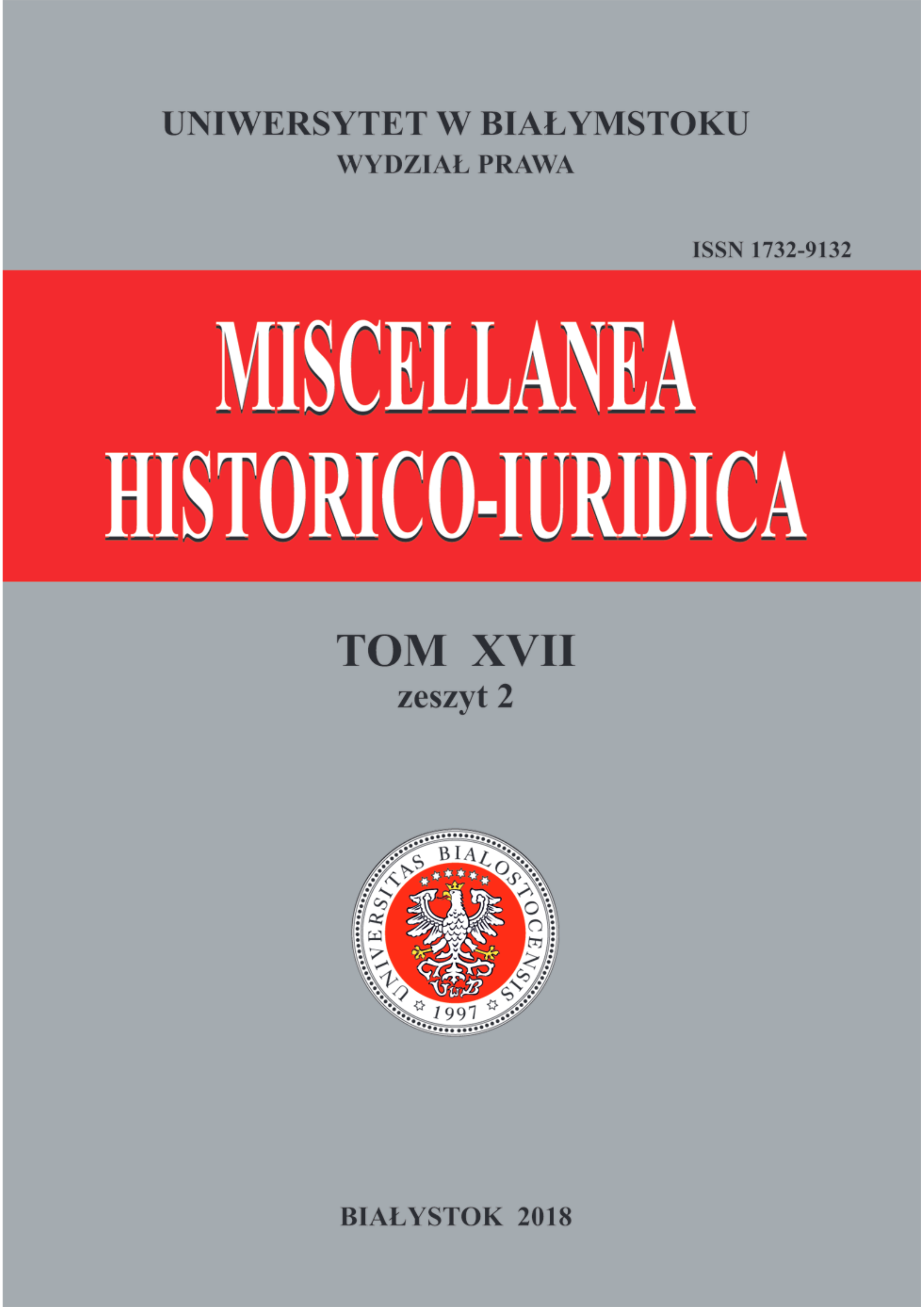Quod vi metusve causa. The Beginnings of protection of the persons performing legal transactions under the influence of coercion in Roman law
Keywords:
metus, formula Octaviana, proscriptions, Seneca the Elder, CiceroAbstract
The aim of the paper is to discuss some issues concerning the origins of the formula Octaviana which provided protection of individuals, who performed a legal act under duress. The research carried out allows to believe that introduction of the formula was related to the proscriptions during Sulla’s dictatorship, and it is probable that the dictator himself, under the influence of Cicero’s Pro Roscio Amerino, allowed it to be included in the pretor’s edict. On the basis of Seneca’s controversies, it is possible to suppose that in the early Principate there were discussions concerning the problem against whom the protection measures given by the praetor in case of metus could be used. It seems that, according to prevailing opinion, it was not the one who used force, but the one who benefited from it.
References
Alexander M.C., Trials in the late Roman Republic, 149 BC to 50 BC, Toronto-Buffalo-London 1990.
Appel H., ‘Calamitas rei publicae’. Cyceron o nadużyciu prawa w mowie wygłoszonej w obronie Roscjusza z Amerii, [w:] ‘Salus rei publicae suprema lex’. Ochrona interesów państwa w prawie karnym starożytnej Grecji i Rzymu, red. A. Dębiński, H. Kowalski, M. Kuryłowicz, Lublin 2007.
Archi G., ‘Ait Praetor: Pacta conventa servabo’. Studio sulla genesi e sulla funzione della clausola nel ‘Edictum Perpetuum’, [w:] ‘De iustitia et iure’. Festgabe für Ulrich von Lübtow, Berlin 1980.
Bieniek S., Geneza interdyktu ‘de vi armata’, „Acta Universitatis Wratislaviensis” nr 63, „Prawo” 1967, nr 18.
Bojarski W.,‘In integrum restitutio’ w prawie rzymskim, „Roczniki Teologiczno-Kanoniczne” 1963, nr 10.
Brennan T.C., The Praetorship in the Roman Republic, II, Oxford 2000.
Broughton T.R.S., The Magistrates of the Roman Republic, II, New York 1952.
Calore E., ‘Actio quod metus causa’. Tutela della vittima e azione ‘in rem scripta’, Milano 2011.
Calore E., Considerazioni sulla clausola edittale “Quod metus causa gestum erit, ratum non habebo”, „Diritto@Storia” 9/2012, http://www.dirittoestoria.it/9/Tradizione-Romana/E-Calore-Quod-metus-causa-gestum-erit.htm.
Cervenca G., Per la storia dell’editto ‘quod metus causa’, SDHI 1965, nr 31.
d’Ors A., El comentario de Ulpiano a los edictos del “metus”, „Anuario de historia del derecho español” 1981, nr 51.
Ebert U.,‘Vi metusve causa’, ZSS 1969, t. 86.
Frier B.W., Urban Praetors and Rural Violence: The Legal Background of Cicero’s ‘Pro caecina’, „TAPA” 1983, nr 113.
Giaro T., ‘Excusatio necessitatis’ nel diritto romano, Warszawa 1982.
González Romanillos J.A., El procedimiento civil como medio de control de la corrupción política. ‘Formula octaviana’ y ‘crimen repetundarum’, „Foro. Revista de Ciencias Jurídicas y Sociales. Nueva Época” 2004, nr 00.
Hartkamp A.S., Der Zwang im römischen Privatrecht, Amsterdam 1971.
Jońca M., ‘Parricidium’ w prawie rzymskim, Lublin 2008.
Kaser M., Zur ‘in integrum restitutio’, besonders wegen ‘metus’ und ‘dolus’, ZSS 1977, t. 94.
Kinsey T.E., The dates of the “Pro Roscio amerino” and “Pro Quinctio”, „Mnemosyne” 1967, nr 20.
Kupisch B., Considerazioni in materia di ‘metus’: l’‘actio quod metus causa’, [w:] Diritto romano, tradizione romanistica e formazione del diritto europeo. Giornate di studio in ricordo di Giovanni Pugliese, red. L. Vacca, Padova 2008.
Labruna L., Alle radici dell’ideologia repressiva della violenza nella storia del diritto romano, [w:] Adminicula, Napoli 1991.
Labruna L., ‘Vim fieri veto’. Alle radici di una ideologia, Napoli 1971.
Lanfranchi F., Il diritto nei retori romani. Contributo alla storia dello sviluppo del diritto romano, Milano 1938.
Lenel O., Das edictum Perpetuum. Ein Versuvch zu seiner Wiederherstellung, Leipzig 1907.
Lintott A., Violence in Republican Rome, Oxford 1968.
Martens R., Durch dritte verursachte Willensmängel, Tübingen 2007.
Robinson O.F., Penal Practice and Penal Policy in Ancient Rome, London – New York 2007.
Tarwacka A., ‘Nihil consensui tam contrarium est quam vis atque metus’. The Origins of Provisions against Duress in Roman law, [w:] Principios generales del derecho. Antecedentes históricos y horizonte actual, red. F. Reinoso, Madrid 2014.
Tarwacka A., O sprawiedliwości i prawie. 1 tytuł 1 księgi digestów. Tekst – tłumaczenie – komentarz, „Zeszyty Prawnicze” 2003, nr 3.2.
Venturini C., ‘Metus’, [w:] Derecho romano de obligaciones: homenaje al profesor José luis murga Gener, Madrid 1994.
von Lübtow U., Der Ediktstitel ‘Quod metus causa gestum erit’, Greifswald 1932.
Watson A., The Dvelopment of the Praetor’s Edict, „JRS” 1970, nr 60.
Zabłoccy M. i J., Ustawa XII Tablic. Tekst – tłumaczenie – objaśnienia, Warszawa 2013.
Zimmermann R., The Law of Obligations. Roman Foundations of the Civilian Tradition, Oxford 1996.







